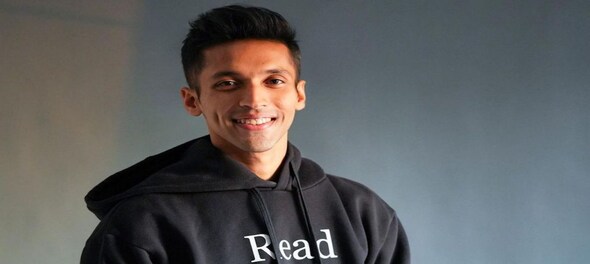
One of India’s highest-selling romance authors, Durjoy Datta, is out with his latest title, When I Am with You, which explores the old adage of how we can never really plan on love.
Other than meditations on romance, the book—Datta’s 21st—also delves into cryptocurrency and cricket. Datta’s first was published when he was 21. Since then, along with novels, he has also written over a thousand episodes for nine television shows.
In this exclusive interview, he discusses the perils of getting published early in life, his writing process, his favorite novels, his thoughts on collaborative writing, whether there is a secret to writing a bestseller, and why he lets his editor decide the title of his novels.

Q. At 35, you have published 20 novels. How do you maintain such an enviable prolificity?
A. I think I used to be more prolific than I’m now. Until a few years ago, I was writing two books a year. I have slowed down now because I’m a father now, there’s crippling self-doubt, and of course, the internet.
I write a book a year now which is still not bad, I guess. I can write a lot because I really like to do it and there’s nothing else I would rather do. My best days are when I write a lot. Or when I read.
Q. The title, When I Am with You, is quite understated compared to your other books. What changed?
A. My editor, Vaishali Mathur, decides on my titles. She gives me a bunch of options and I pick one of them. I really liked the title. Of course, this book is not titled like say, “She Broke Up, I Didn’t. . . I Just Kissed Someone Else”, which was fun at the time, but now, it feels like I was trying too hard to be funny. So, titles are best left to editors who know what they are doing.
Q. You co-authored your first few books with other writers. What is the biggest perk and pitfall of collaborative writing? Would you suggest aspiring writers take this route?
A. The perk is you have someone working on the book who has some stake in the book. The pitfall is your ego. When I was younger, I wasn’t unsure about my voice; so, I could write with co-authors. Now I don’t think I can do that. I wouldn’t suggest this route to anyone who’s sure about their writing.
Q. Is there a secret to writing a bestseller?
A. No, there isn’t. I have tried doing that in the past and failed miserably. I have tried to construct bestsellers and study my own books that have worked better but it hasn’t worked for me. So now, I write books that I want to write.
Q. What is your writing process like?
A. The first step is excitement about a new idea. Then comes the dampener. There are no new ideas. I search and find that there are many books already written on the new idea. I buy them all and read them all. Then, I find that the idea might be the same, but I have a different way of saying it. Then I start writing. Haphazardly at first, quite pointlessly too, but then, slowly everything gets sharper and into focus.
Q. There are stories all around us. How do you assess that an idea is potent enough for a full-length novel?
The correct answer is that I don’t know until I’m 70 percent into the book. It’s like driving in the dark with your headlights off.
Q. One boon and bane of being a published author at 21?
A. I would have been a much better writer had I been tested a little bit more when I was young. When you get published early, your growth is hampered. The boon is that I could make a career out of it because I started getting paid very early.
Q. How is writing a book different from writing for TV? What do you enjoy doing more?
A. I enjoy writing books more. There are no budget constraints, no TRPs, no reliance on actors. But writing for TV is a more dynamic process compared to the solitary activity of writing a book. And if a TV show fails you only shoulder a part of the blame, but when a book fails, it’s all you.
Q. Not so long ago, Indian commercial fiction, especially in English, was frowned upon. But over the last few years, it has found not just acceptance, but also popularity. What do you think is the reason for this shift?
A. It only got frowned upon—and sometimes quite rightly so—in literature festivals by semi-literary writers and by extremely well-read readers mostly because they couldn’t fathom why so many people liked the books they didn’t like. Most buyers in bookstores don’t care about literary/commercial. It’s a terminology only known to us.
Q. Your three favorite novels of all time.
A. Hannibal Lecter series by Thomas Harris, The Namesake by Jhumpa Lahiri, and Midnight’s Children by Salman Rushdie.
Q. One book that you read recently and absolutely loved.
A. Lessons in Chemistry by Bonnie Garmus.
First Published: Dec 8, 2022 2:52 PM IST
Check out our in-depth Market Coverage, Business News & get real-time Stock Market Updates on CNBC-TV18. Also, Watch our channels CNBC-TV18, CNBC Awaaz and CNBC Bajar Live on-the-go!


Supreme Court says it may consider interim bail for Arvind Kejriwal due to ongoing Lok Sabha polls
May 3, 2024 4:57 PM
10% discount on fare on Mumbai Metro lines 2 and 7A on May 20
May 3, 2024 2:40 PM

